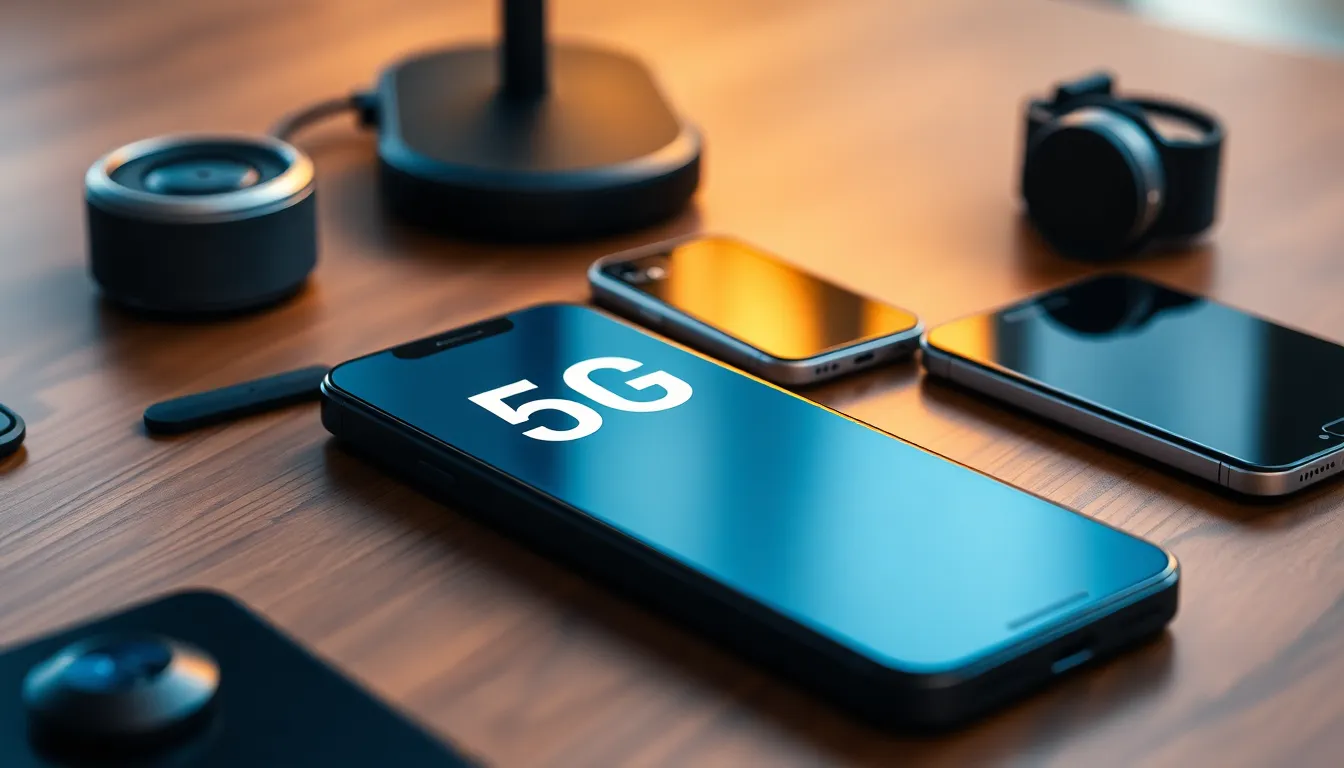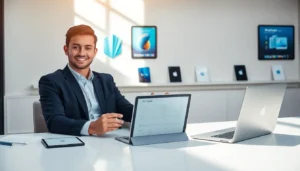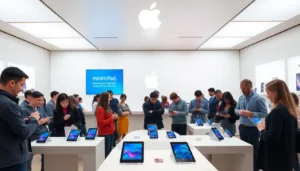Table of Contents
ToggleAs the world races into the 5G era, iPhone users are left wondering if their trusty iPhone 11 can keep up with the lightning-fast speeds. After all, who wouldn’t want to stream their favorite shows in ultra-high definition while waiting for their morning coffee? But alas, the iPhone 11 was born in a time when 5G was just a twinkle in Apple’s eye.
Overview of 5G Technology
5G technology represents the fifth generation of mobile networks, evolving significantly from its predecessor, 4G. Users experience substantial improvements, including enhanced speed, lower latency, and increased capacity. Speed can reach up to 10 gigabits per second, allowing for quick downloads and seamless streaming.
Lower latency significantly enhances responsiveness, making activities such as gaming and video conferencing smoother. The technology supports a higher density of connections, accommodating more devices simultaneously without a degradation in performance. Such improvements benefit various sectors, including healthcare, where remote surgeries become more viable.
5G operates across multiple frequency bands. These bands, including low-band, mid-band, and high-band, cater to specific use cases. Low-band provides wider coverage but at slower speeds, while high-band, or millimeter-wave, delivers ultra-fast data rates over shorter distances. The mid-band balances speed and coverage, making it ideal for urban environments.
As cities expand their 5G infrastructure, users can expect increased availability in metropolitan areas. Businesses also leverage 5G for innovations such as smart factories and autonomous vehicles, enhancing operational efficiencies.
Adopting 5G technology leads to transformative changes across industries and everyday life. The continual rollout aims to make high-speed, reliable connectivity accessible to more people. Understanding the implications of 5G helps consumers navigate their device choices, especially when considering compatibility with current technology.
Compatibility of iPhone 11 with 5G

The iPhone 11 isn’t compatible with 5G networks, limiting users’ access to the benefits of this advanced technology. Manufacturing occurred before the rollout of 5G, which means it lacks the necessary hardware for connectivity.
Network Requirements
5G networks require specific hardware and software configurations to function. These include a 5G modem and updated antenna designs. Users can’t connect their iPhone 11 to the high-speed capabilities of 5G networks. Network providers typically offer options like low-band, mid-band, or high-band 5G, but the iPhone 11 lacks any of these compatible technologies.
Hardware Limitations
Hardware limitations hinder iPhone 11’s ability to utilize 5G. It features the A13 Bionic chip, which supports operations on 4G LTE networks but does not include the 5G modem essential for connection. Apple released devices, such as the iPhone 12 and later models, with integrated 5G technology, ensuring enhanced performance and connectivity options. Users seeking the advantages of 5G must consider upgrading to a compatible device to experience faster speeds and improved performance.
Alternatives for 5G Connectivity
Users seeking 5G access must consider alternative devices or upgrading options. Several smartphones support this advanced technology, allowing users to experience faster speeds and improved performance.
5G Capable Devices
Numerous devices offer 5G compatibility, making them suitable for users wanting enhanced connectivity. The iPhone 12 and newer models, such as the iPhone 13 and iPhone 14, support 5G networks. Samsung’s Galaxy S21, Google Pixel 5, and OnePlus 9 are examples of popular alternatives in the Android space. Each device provides seamless access to 5G, enabling quicker downloads and smoother streaming experiences.
Upgrading Options
Upgrading to a newer iPhone represents a straightforward way to access 5G connectivity. It offers the most immediate solution for iPhone 11 users needing faster network capabilities. The iPhone 12, for instance, introduces essential hardware improvements like a 5G modem and advanced antenna designs. Consider budget and features when selecting a new device, as various models provide diverse capabilities and price points.
User Experience with iPhone 11
Users experience limitations with the iPhone 11 regarding 5G compatibility. Many express frustration over not accessing the enhanced speeds and responsiveness that 5G offers. This device, released before the widespread rollout of 5G technology, lacks the necessary hardware components for connectivity.
Streaming services and video calls may not provide the seamless experience users desire with 5G. iPhone 11 owners often mention waiting for video buffers when using extensive data, particularly during busy times. Without 5G, download speeds peak at 4G LTE levels, which can’t match the up to 10 gigabits per second provided by 5G networks.
When considering device upgrades, users find various options that support 5G. iPhone 12 and newer models are commonly recommended due to their integrated 5G modems and advanced design features. Additionally, Android alternatives such as Samsung Galaxy S21 and Google Pixel 5 also appeal to users seeking faster connections.
In urban areas, where 5G infrastructure continues to expand, many users notice significant improvements with compatible devices. iPhone 11 owners often discuss needing a device that can fully utilize the benefits of emerging network technologies. Budget and features vary across models, so users should evaluate their priorities when upgrading.
Choosing a newer smartphone not only enhances connectivity but also improves overall performance. Users seeking to improve their experience often feel compelled to transition from the iPhone 11 to enjoy the advantages of advanced network technology.
The iPhone 11, while a capable device, falls short in the realm of 5G connectivity. Users looking for the speed and efficiency that 5G offers will find themselves limited by the iPhone 11’s lack of essential hardware. With the rapid rollout of 5G networks and the growing demand for faster internet experiences, upgrading to a newer model becomes a practical consideration.
Devices like the iPhone 12 and beyond provide the necessary support for 5G, unlocking the potential for enhanced streaming and seamless communication. As technology continues to evolve, making an informed choice about device compatibility will be crucial for maximizing connectivity and performance.




